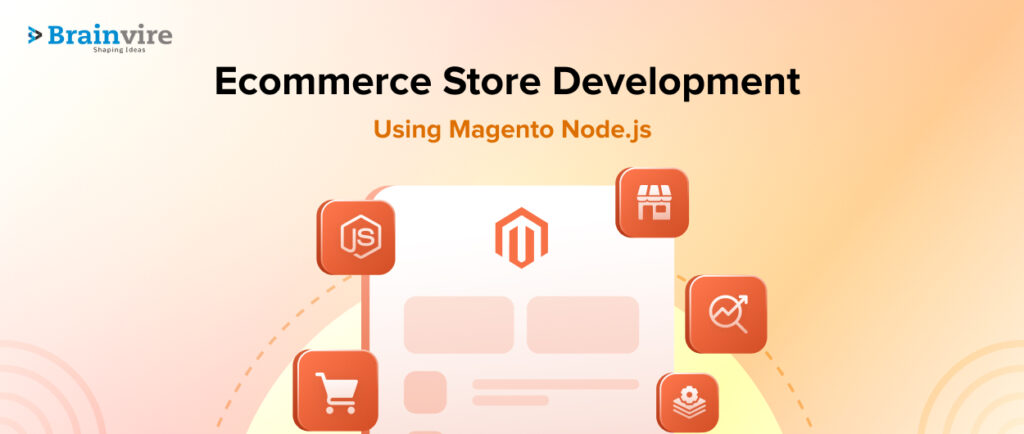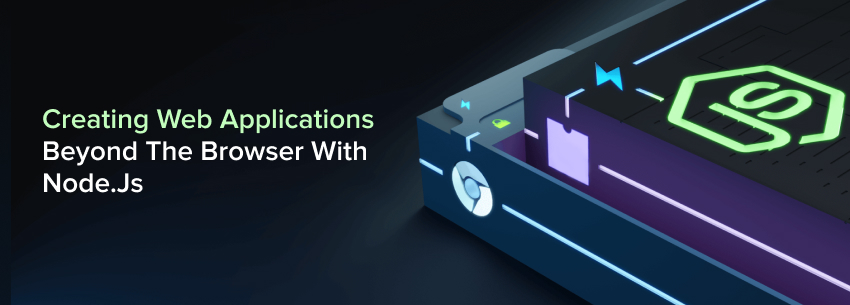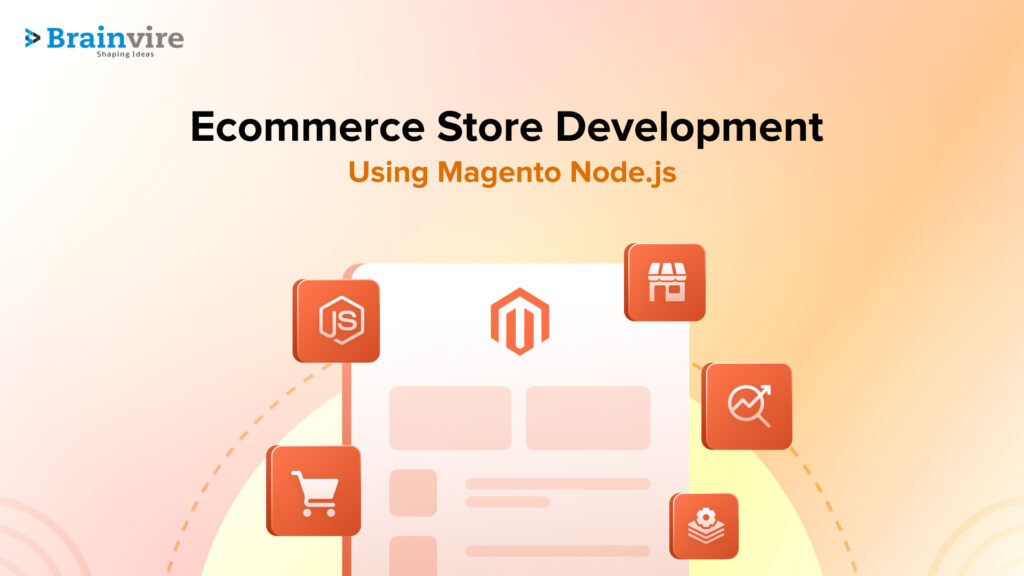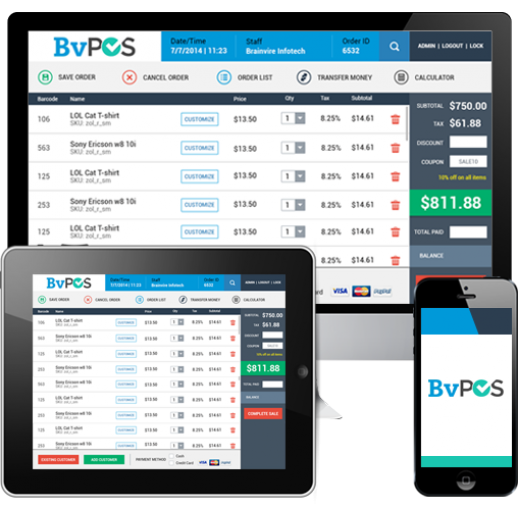The business world is digitizing at an unprecedented pace with growing access to high-speed internet. This has fuelled the demand for eCommerce stores, with most businesses striving to create and maintain an effective online presence. Most businesses re choosing Magento 2 migration for all their eCommerce-related needs.

However, what’s more interesting is that businesses are now leveraging Node.js for Magento 2 eCommerce development.
But is this a feasible idea for your business based on your specific needs and requirements?
This article will explore all nuances associated with using Node.js for Magento 2 development. So make sure you read till the end to understand the matter better.
Understanding Magento 2: What Makes The Platform Unique?
Magento 2 is one of the leading eCommerce solutions for online retailers. The developer-centric platform offers ample features and functionalities to facilitate eCommerce business management. You can access features like sales management and inventory management, among many other relevant features.

One important thing to know here is that Magento 2 is the updated version of Magento 1, also known as Adobe Commerce. This updated platform is easily compatible with PHP7 and offers highly efficient loading speed. Besides that, Magento 2 is very important in helping you build SEO and mobile-friendly websites that deliver unmatched user experience.
Magento 2 has ample features, making it the ideal choice for most eCommerce retailers. Some of the best-known Magento 2 features include access to more than 3720 extensions, seamless customization, advanced security, and multiple payment gateway alternatives, including some of the most popular ones, such as Venmo and PayPal. Besides that, Magento 2 also supports multiple currencies, offers fast loading speed, seamless integration with the Search Console and
Google Analytics, and ensures that websites remain optimized for search engines.
More than 200,000 business websites were built on Magento 2, meaning about 0.72% of all eCommerce use on the entire internet. The features that come with the platform are fuelling the popularity of Magento 2 among eCommerce business owners. This makes it much easier to create highly performant eCommerce platforms for driving better results with minimal effort. This helps businesses save scarce resources without compromising on the usability and quality of the website.
Introduction To Node.js
Node.js is one of the leading cross-platform, open-source JavaScript runtime libraries and environments.

This helps developers create and run web applications on the exterior of the client’s browser. Node.js has gained unmatched popularity among developers who use it to create server-side web applications. Besides that, Node.js leverages a unique asynchronous event-driven model, helping developers easily create data-intensive applications.
Node.js Development has played a very important role in making web development easier with faster execution time. It is built on the V8 engine of Google Chrome and also offers developers more than 50,000 bundles in the Node Package Manager. This helps one add many different features and create the ideal application for their clients.
Another important aspect of Node.js is its unique single-threaded architecture, making it highly scalable based on your needs. This is different from other servers with limited threads that make it challenging to process all requests. Besides that, Node.js comes with a non-blocking I/O model, making it ideal for many businesses like Walmart, Netflix, and more.
When it comes to package management, there is hardly any match for Node.js in the current market. The primary reason behind this is the NPM, an abbreviation of the Node Package Manager. This is a default package manager for all Javascript runtime, such as Node.js.
The NPM consists of two components: an online repository for hosting JavaSWcript packages and a CLI or common line interface tool for publishing and downloading packages. This works like a fulfillment center where you can access ample Node.js packages from sellers of NPM package authors. These packages are then distributed among NPM package users or buyers.
The NPM leverages the potential of NPM CLI, an army of dedicated wombats assigned as personal assistants to each NPM package customer or buyer. These dependencies are then distributed among the customers to help them develop feature-rich applications with minimal effort. One can even upload more NPM packages to help buyers access the package based on their needs.
Node.js in Magento 2: The Use Cases

Node.js in Magento 2 elevates your team’s activity and performance as it uses the same coding language on both the front and back end. Therefore, it results in an easier and quicker Magento website development process while reducing development costs. It has several amazing real-time features like real-time notifications, live chat support, user personalization, dynamic pricing, inventory management, shopping cart updates, order tracking, and customer engagement.
Node.js Development services plays a pivotal role in enabling real-time capabilities within Magento 2. By offering a flexible and event-driven runtime environment, Node.js empowers developers to create dynamic features like live chat, product recommendations, and instant updates on eCommerce websites.
This enables Magento 2 to provide a seamless shopping experience, offering customers instant updates, personalized recommendations, and real-time support interactions, thereby enhancing user engagement and satisfaction in online stores.
Magento 2 offers real-time features to enhance the shopping experience of a user as well as merchants. Some examples of these real-time features include dynamic and automatic pricing, which allows prices to update automatically and instantly based on market conditions, promotions, customer location, quality, etc. Consulting with an Adobe Experience Manager consultant can further optimize these features by ensuring seamless content management and personalized digital experiences. This makes it much easier to create the ideal application based on the specific needs and requirements of the eCommerce business.
Improved Performance
Performance is crucial in eCommerce, as it plays a pivotal role in shaping user experience and business outcomes. A swift and efficient website elevates customer satisfaction and bolsters conversion rates and sales figures. On the flip side, sluggish page loading times can lead to customer frustration, resulting in higher bounce rates and abandoned shopping carts.
Node.js offers a compelling solution to enhance the performance of Magento 2. Traditionally, Magento relies on a synchronous PHP execution model, which can create performance bottlenecks when handling multiple concurrent requests. However, Node.js brings asynchronous and event-driven capabilities to the platform. This change enables Magento 2 to process tasks such as server-side rendering, AJAX requests, and asynchronous API calls more efficiently.
By adopting this asynchronous approach, Magento 2 can deliver faster response times and improved user experiences. Furthermore, Node.js enhances scalability and responsiveness, making it easier for Magento 2 to handle high traffic levels while maintaining optimal performance. Several case studies have shown that Node. js has reduced the loading time by 50-60% and development cost by 58%. Popular companies like PayPal and Netflix have experienced elevated performance after integrating Node.js.
Scalability
Scalability poses a significant concern within the realm of e-commerce, where businesses grapple with the imperative to adapt to expanding customer demands and transaction loads. In the context of the booming online retail landscape, eCommerce platforms frequently encounter hurdles in the form of scaling their technological infrastructure to accommodate surging website traffic, burgeoning product catalogs, and intensified customer interactions.
Ensuring seamless performance, especially during peak shopping seasons, and upholding swift page load times while managing multiple concurrent user sessions remain central challenges. Overcoming these scalability obstacles necessitates substantial investments in server capacity, proficient database administration, and meticulously optimized code.
Node.js plays a crucial role in enhancing the scalability of Magento 2. Unlike traditional server-side scripting languages, Node.js is event-driven and non-blocking, which allows Magento 2 to efficiently manage multiple connections concurrently. Node.js empowers developers to create responsive and interactive front-end features, ultimately improving the user experience on Magento 2 websites.
By harnessing Node.js, Magento 2 becomes more adept at handling heavy traffic loads, ensuring a responsive, scalable, and high-performance e-commerce platform suitable for businesses of all sizes. That is why many eCommerce companies credit Magento 2 for the 10-80% increase in their revenue. Giant companies like Uber, Linkedin, Groupon, Walmart, etc. use Node.js to scale their websites.
Efficient Backend Development
Efficient backend development is essential when working with Magento 2 because it plays a crucial role in enhancing eCommerce website performance. Achieving this includes following the coding rules, implementing modular code architecture, and harnessing the capabilities of Magento’s CLI for automation.
Node.js uses JavaScript for backend development, which encourages the reusing of codes and simplifies the entire development process. It boasts many open-source libraries and packages accessible to NPM, streamlining development and shortening time-to-market. Also, Node.js empowers Magento 2 developers to create fast, lightweight, and responsive web applications,
making it a reliable option for modern backend development.
Node.js is an excellent choice for the backend development in Magento 2 as it stands out in terms of speed, flexibility, and scalability. Thanks to its event-driven, non-blocking I/O architecture for seamlessly handling multiple connections simultaneously, Node.js is great for real-time applications and high-traffic websites. This also justifies why most popular web platforms choose Node.js to manage traffic flows into their websites better.
Integrating Node.js With Magento 2: An Overview To The Process

Integrating Node.js with Magento 2 involves a series of steps to enhance your e-commerce website using server-side JavaScript. It is important to ensure you start with establishing a Node.js environment and installing the necessary packages through npm or yarn. Next, create custom endpoints in your Magento 2 store to facilitate communication with Node.js.
Utilize frameworks like Express.js to build robust API routes. Ensure seamless data synchronization between Node.js and Magento 2, utilizing REST or GraphQL APIs. To boost frontend performance, consider implementing server-side rendering (SSR) with tools such as Next.js, enhancing both SEO and user experience. Finally, deploy and maintain your Node.js application alongside Magento 2, ensuring compatibility and scalability within your e-commerce ecosystem.
However, integrating Node.js with Magento 2 also attracts some challenges that developers must be aware of to get the best results. One of the best-known of these challenges includes the callback pyramid, which many also refer to as the callback hell. Since Node.js has asynchronous operations, it can often make maintaining and reading the code challenging. However, taking a cleaner approach can help you better manage asynchronous codes when integrating Node.js with Magento 2.
Besides, performance optimization can be another significant challenge when integrating Node.js with Magento 2. While Node.js aces all criteria in terms of performance, it can still be challenging to use the framework’s performance capabilities to its full potential.
The best way to address this challenge is by profiling the applications using the built-in profiler or other external tools available in the market. You must use asynchronous operations and optimize important code sections for the best results.
Fortunately, there are many best practices for integrating Node.js with Magento 2 and getting the best results. For starters, you can consider separating codes based on their functionality, making maintaining all parts of the code easier.
You can consider dividing codes into specific criteria such as the controller, routes, views, and models. Besides that, modularizing your codes can also go a long way. You can simply identify reusable modules and store them in separate files to ensure codes remain more organized, making it easier to make sense of them.
Node.js Modules and Libraries for Magento 2
Node.js modules and libraries are invaluable assets for enhancing the capabilities of Magento 2, a widely used e-commerce platform. These tools offer diverse functionalities that can streamline development processes and boost server-side performance.
Key modules and libraries include ‘npm’ for efficient package management, ‘Gulp’ for task automation, ‘Babel’ for transpiring ES6+ code, and ‘Webpack’ for optimizing asset bundling.
Moreover, libraries like ‘Axios’ facilitate seamless API integration, while ‘Lodash’ simplifies data manipulation tasks. By leveraging these resources, Magento developers can craft robust and scalable Magento 2 applications, delivering customers an enhanced online shopping experience.
Choosing the appropriate modules for your Magento 2 project requires careful consideration. Access your projects’ specific needs, pinpoint objectives, prioritize modules compatible with Magento 2 and your project goals, and opt for active community modules. Following these steps, you can select the best modules that suit your Magento 2 project requirements.
But besides that, you can also take certain other steps to make the most of Node.js libraries for Magento 2. For instance, you can consider creating a configuration file declaring the Magento 2 module to easily store all relevant information and dependencies. This will help you facilitate better scalability, personalization, and flexibility. As a result, it becomes much easier to realize your eCommerce goals with a performant eCommerce platform.
Future Trends and Considerations: What’s In Store For NodeJS Users?
The integration of Node.js and Magento 2 is rising, leading to faster, more responsive eCommerce websites. While Node.js remains a favored choice for programming due to speed and efficiency, Magento 2 focuses on personalized shopping experiences, headless commerce, and Progressive Web Apps.
Yet there are still some noteworthy trends in this sphere that you can use to your advantage. For instance, the development of real-time applications with Node.js and Magento has been gaining much traction recently. Besides that, the use of cloud computing and the Internet of Things (IoT) is another trend that plays a key role in shaping today’s modern eCommerce industry. Microservices eCommerce architecture is another notable trend in Node.js and Magento 2 developments.
Predicting the future of Node.js and its role in Magento development reveals a promising landscape for eCommerce sites. Node.js is expected to maintain its position as a preferred technology for building robust-performing web applications. After being integrated with Magento 2, Node.js will increase the overall activity in the eCommerce platforms, leading to rapid and seamless interactions. As a result, more businesses will likely consider leveraging the potential of Node.js and Magento 2 to drive better growth.
Businesses in today’s digitized business environment must deal with much competition with lower entry barriers. However, leveraging the latest trend can be very helpful in keeping businesses a step ahead of the competition. But this will also require businesses to take a well-thought-out approach towards using Node.js for Magento 2 development. This means ensuring you are mindful of all the latest trends and use them to your advantage. You can even hire Magento 2 developers to determine those trends better and use them to your advantage.
Challenges and Pitfalls
When integrating Node.js with Magento 2, awareness of common challenges and potential pitfalls is essential. It can be quite complex, demanding meticulous configuration to avoid compatibility issues. Performance optimization is another concern, as the wrong use of Node.js can lead to slower page loading and inefficient server resource utilization.
To overcome the challenges of using Node.js with Magento 2, prioritize performance optimization by implementing caching mechanisms, eliminating unnecessary server requests, and optimizing code to ensure the fast loading of items in the eCommerce website. Emphasize security with regular vulnerability assessments and security tools to safeguard Node.js applications.
Following some of the best practices is essential to avoid potential issues. Maintain comprehensive documentation by including dependencies and configurations to simplify troubleshooting and future updates. Uphold optimization, performance testing, stringent security means, robust authentication, authorization mechanism, and vigilant monitoring. These steps will reduce the risk of potential issues and combat challenges while integrating Node.js with Magento.
Focusing on these specific best practices can be very helpful in ensuring you meet all your organizational goals with Node.js and Magento 2. So leverage effective optimization, test the app’s performance, and ensure effective authorization with strong authentication. Besides that, effective monitoring at all points can also go a long way in helping you make the most of Node.js and Magento 2.
Conclusion
Magento 2 is a popular eCommerce platform with various features and functionality that boosts business operations and management. Node.js, on the other hand, Node.js is a cross-platform, open-source Javascript used for running web applications. It allows developers to create a seamless and efficient website. Incorporating Node.js into Magento 2 represents a solid synergy between technologies, promising significant improvements in user engagement and efficiency of eCommerce sites.
By harnessing Node.js for real-time interactions and backend operations, businesses can obtain quick loading of contents, increased scalability, and superior responsiveness. This integration holds assurance for intricate and substantial eCommerce stores, empowering them to remain competitive in the online business realm.
Read more: Magento 2.4.6: The Latest Advancements And How To Make The Most Of Them
FAQs
Node.js is a cross-platform, open-source Javascript runtime, allowing developers to run Javascript code on the server side. It is used in Magento 2 to optimize eCommerce applications and scale them for greater improvements.
Instant notifications, real-time chat, inventory management, price updates, order tracking, shopping cart updates, personalized recommendations, etc., are some of the real-time examples enabled by Node.js in Magento 2.
Set up a Node.js application and then install the necessary modules. Authenticate the application with Magento 2 API, then implement the varied features with your Magento 2 store.
Several problems like slow loading, improper configuration, inefficiency, and compatibility issues. They could arise while implementing Node.js with Magento 2. All these problems can affect the interaction of users with the website.
Axios, Websocket, Express.js, Socket.io, Sequelize or Mongoose, etc., are some of the modules and libraries used with Magento 2.
Nike, Coca-Cola, Levi’s, Nestle’s Nespresso, etc., are real-world examples of businesses successfully using Node.js in Magento 2.
Related Articles
-
Progressive Web App Development In Magento 2
Mobile users have seen an astronomical rise in the past decade, so if businesses want to excel in this digital realm, they must approach customers who use mobile devices for
-
Magento 2: The Top Ten New Exciting Features
In our past blogs, we had already discussed how Magento Ecommerce Development can benefit our business and how to install Magento 2. Now, in this article, we will take a
-
Five Benefits Of Implementing A Mobile Point-of-Sale System
Talking About Five Benefits Of Implementing A Mobile Point-of-Sale System, It is clear that retailers are making the use of mobile technology to run their business more effectively. The mobile




